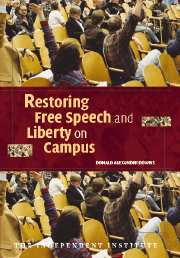Book contents
- Frontmatter
- Contents
- Acknowledgments
- Preface
- PART I INTRODUCTION AND BACKGROUND
- PART II CASE STUDIES IN THE POLITICS OF CIVIL LIBERTY ON CAMPUS
- 3 Columbia's Sexual Misconduct Policy: Civil Liberty versus Solidarity
- 4 Berkeley and the Rise of the Anti–Free Speech Movement
- 5 Undue Process at Penn
- 6 Renewal: The Rise of the Free Speech Movement at Wisconsin
- 7 Abolition in the Wisconsin Faculty Senate and Its Aftermath
- PART III CONCLUSIONS
- Appendix
- Index
3 - Columbia's Sexual Misconduct Policy: Civil Liberty versus Solidarity
Published online by Cambridge University Press: 12 July 2009
- Frontmatter
- Contents
- Acknowledgments
- Preface
- PART I INTRODUCTION AND BACKGROUND
- PART II CASE STUDIES IN THE POLITICS OF CIVIL LIBERTY ON CAMPUS
- 3 Columbia's Sexual Misconduct Policy: Civil Liberty versus Solidarity
- 4 Berkeley and the Rise of the Anti–Free Speech Movement
- 5 Undue Process at Penn
- 6 Renewal: The Rise of the Free Speech Movement at Wisconsin
- 7 Abolition in the Wisconsin Faculty Senate and Its Aftermath
- PART III CONCLUSIONS
- Appendix
- Index
Summary
In February 2000 the university senate at Columbia enacted a radically innovative new “Sexual Misconduct Policy” that sought to encourage victims of sexual assault to be more willing to press formal charges against their attackers. Comparing the number of rape victims being treated by the hospital adjoining the campus (St. Luke's) with the small number of incidences reported by the university, advocates of the new policy came to two conclusions: first, that the university's administration was covering up an epidemic of rape on the campus and, second, that the existing university systems of adjudication – the old “Dean's Discipline,” and a new reform adopted in 1995 – were inhibiting already traumatized victims from reporting attacks. In addition, certain procedural rights of the defendants – including the rights to be present during all testimony, to confront the accuser, and to be accompanied by an attorney – purportedly added to the discomfort of the victim in pursuing a case through trial.
The activists, claiming that the system's procedures and protections amounted to mind-boggling bureaucratic “red tape,” mobilized a mass political campaign to pressure the university and the university senate to pass the new sexual misconduct policy. Interestingly, the traditional “Dean's Discipline” for adjudicating sexual misconduct cases had also failed to guarantee expressly defendants' procedural rights, a situation that is surprisingly typical of most campus judicial systems. (But deans could provide such rights on a case-by-case basis.)
- Type
- Chapter
- Information
- Restoring Free Speech and Liberty on Campus , pp. 67 - 106Publisher: Cambridge University PressPrint publication year: 2004



